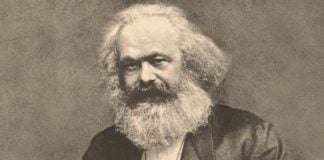In 1871 workers took power in Paris. Their actions taught Karl Marx about the need to dismantle the existing state in order to bring about socialism writes Tom Fiebig
Marx’s Civil War in France chronicles the first time in history that the working class took power, showing the workers’ movement everywhere that another world is possible.
The text contains Marx’s lengthy addresses to the International Working Men’s Association (the First International), a loose collection of socialists and trade-unionists in which he had been a leading member since 1864. In this address, adopted by the General Council, Marx attests to the incredible feats of the Paris Commune, hurling a barrage of vitriol and insult at its gravedigger, the “monstrous gnome”, M. Thiers.
Speaking a mere days after its brutal suppression by the French state, Marx mounts an inspired defence of the power, and revolutionary potential, the Parisian workers demonstrated in their struggle. And although he and his long-time collaborator Friedrich Engels were unable to significantly influence the workers’ struggle from abroad, they didn’t just gloat over events from an “ivory tower”. Instead, they drew not only inspiration but significant political lessons from the Commune, most importantly, that workers had to smash the organs of the capitalist state
Between the aborted French revolution of 1848 and the Paris Communes of 1871, capitalism had produced a significant expansion in industrial production in France. At around this point in time Paris contained as many as half a million industrial workers. In July 1870, France’s Emperor Louis-Napoleon was provoked by Otto von Bismarck into declaring war against Prussia. After his devastating defeat by Prussian forces at Sedan, Louis-Napoleon was forced to abdicate. A new republican government was formed on 4 September 1870, with the 71-year-old Adolphe Thiers at its head.
Paris besieged
For the next five months, Paris lay under siege. In order to protect the city and its citizens from Prussian invasion, Thiers was forced to establish a volunteer army, the National Guard, the bulk of which consisted of Parisian workers. The working class was now armed.
Throughout the siege, the workers of Paris staged regular public demonstrations with demands for a democratically elected government. Fearful of where this might lead, Thiers signed an armistice with Prussia in January 1871, subjecting France to harsh peace terms. The workers of Paris were disgusted at having suffered months of siege for nothing.
As France’s National Assembly moved to disarm Paris’ workers, they fiercely resisted. In the uprising that followed, workers took “undisputed sway” of the city, expelling Theirs’s government to Versailles.
The Commune
The Paris Commune was born. The National Guard, having taken control of key strategic sites in Paris, initiated elections for municipal councillors to govern the city. The “Commune” that resulted represented, in Marx’s eyes, “essentially a working-class government”.
Marx therefore examined it closely to try to understand how a future workers’ government might function. The Commune’s first decree was, naturally, “the suppression of the standing army [and the police], and the substitution for it of the armed people”.
Its council, consisting of 60 members, were not only democratically elected, but were “all, without exception” recallable at any point in time. Councillors were permitted a maximum salary of 6000 francs—equivalent to that of a skilled worker. In subsequent decrees, the Commune also abolished the death penalty, granted citizenship rights for migrants, enacted the separation of Church from State, and seized all Church property as national property.
Marx drew a lesson of utmost importance. Workers had to smash the existing state. He writes that, “the working class cannot simply lay hold of the ready-made state machinery, and wield it for its own purposes.”
As the Parisian workers showed, a working class government could only be established through the dissolution and destruction of the essential organs of the old state. This is because the state had become a tool of the capitalist class.
As Marx puts it, “state power assumed more and more the character of the national power of capital over labor, of a public force organised for social enslavement, of an engine of class despotism.”
Only through the Parisian workers’ actions was Marx able to grasp the impossibility of workers simply taking over the existing state and using it in their own interests. Nowadays after the dictatorial regimes of Stalin, Mao and other forms of “socialism-from above”, Marx’s opposition to the state is often forgotten.
The phrase “dictatorship of the proletariat” used by Marx, Engels, and Lenin is often equated with blind, authoritarian rule. However, as Engels declares in the afterword to Civil War in France, their use of the term did not mean a dictatorship over the proletariat. It meant simply the immediate political supremacy of the proletariat, as a class for itself. He comments: “Look at the Paris Commune. That was the Dictatorship of the Proletariat!”
Marx and Engels were however critical of some actions of the Commune. In their view, the communards should have marched on Theirs’ forces in Versailles immediately after having expelled them from Paris.
The failure to do so gave the latter an opportunity to re-organise and strengthen his army through the return of prisoners of war, granted freedom by Bismarck.
The communards also showed an inexplicable respect for property by failing to seize the cash reserves kept in the national bank of Paris, which contained all the country’s gold reserves. In Engels’ mind, “this was also a serious political mistake. The bank in the hands of the Commune—this would have been worth more than 10,000 hostages.”
Thiers and his forces gained Bismark’s blessing to pass through Prussian lines and advance on Paris. On 21 May 1871, his army stormed the city and slaughtered tens of thousands of Parisians.
The Commune was crushed. But as Marx wrote elsewhere in a letter to his friend Ludwig Kugelmann, their brief experiment with workers powers provided, “a new point of departure of worldwide significance”.





